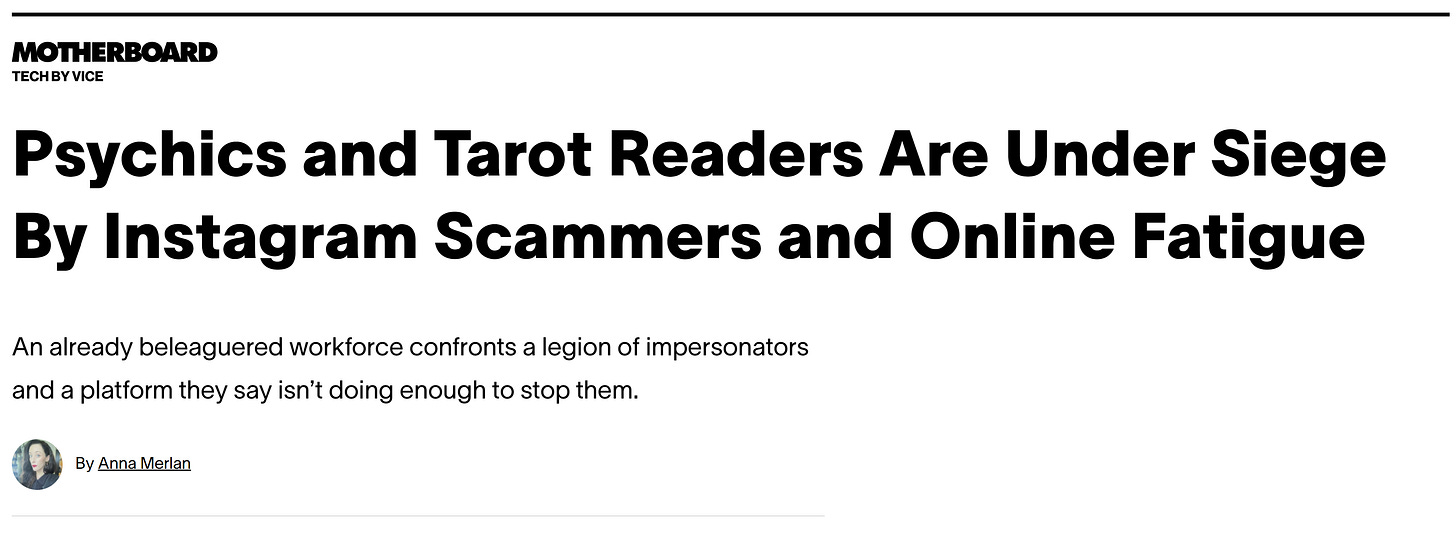We Could Use a Reinvigorated Skeptic Movement
the backlash to New Atheism has gone too far
Good gravy.
Forgive me for being ponderous in saying that psychics and tarot readers complaining about scammers is like flat earthers complaining about misinformation. It takes some real guts to get mad that some other people are committing fraud in your fraudulent industry. I suppose there’s many professionals in this community that really believe in what they’re doing, although there’s also certainly many that know it’s bunk and keep the con going anyway. But it ultimately doesn’t matter; when the basis of your behavior is so absurd and so lacking in evidentiary standing, you’re responsible for the fraudulence even if you believe in what you’re saying.
I recognize the point that what’s at issue here includes stuff like people on Instagram impersonating famous psychics and charging others for readings on that false pretense, and I guess that’s bad. But it doesn’t change the fact that these are scams built on the back of other scams. It’s fraud all the way down.
The first thing I ever wrote that got more than a couple dozen views, the piece that made the rounds in the blogosphere and in so doing kickstarted my writing career, was a piece of the type “I’m an atheist who can’t stand New Atheism.” Pieces in that vein became quite common over the years, but in 2008 it was still novel enough to attract all of that attention. This was an era in which the New Atheists still enjoyed a degree of cultural cachet, before the pomposity and shrill tone of so many in the movement curdled its public reputation, to say nothing of the accusations of Islamophobia. It was a different time. The basic contours of the piece still seem correct to me - atheism is almost certain factually true, and I am an atheist, but I have no interest in browbeating believers. I have no interest in converting believers into atheists, and atheism is not a movement. But not only would I not write that piece today, it’s one of very few pieces that I sometimes genuinely wish I had never published at all. Because the ground changed underneath us to such an extent that, well, millions of functioning adults proudly endorse astrology and other hooey in public.
At some point in the 2010s, the backlash to New Atheism became so commonplace, particularly on the political left, that it seemed clear to me that we had communally missed the forest for the trees. That is to say, no matter how annoying some atheists must be, the most important question when it comes to atheism remains (and must remain) whether or not God is real. If God is real, that is the single most important fact in the universe. Issues of comity and messaging take a backseat to the existence of a divine creator, and there’s something strange about being more concerned with how we express our skepticism about such a divine creator than about its actual existence. And while many people who disdain New Atheists will admit to a casual atheism themselves, they’re far less animated and passionate about that atheism than about their hatred of the New Atheists. On a really basic level this seems to be a failure of priority.
Meanwhile, some of the more militant anti-New Atheists did turn to more overt religiosity, such as the whole “tradcath” thing, and perhaps worse the dimming of the light of generalist skepticism seemed to contribute to the ever-metastasizing cultural tumor of woo woo and irrationality. This is frequently chalked up to living in an increasingly stressful era; I have never seen satisfying proof that there’s anything more stressful about now as compared to, say, George W. Bush’s United States, but thus the story goes. One way or another, you have people role-playing as traditionalist Catholics and people getting really invested in witchcraft as a political tool and all manner of bizarre hokum about seed oils or heavy metals in food or similar. It all worries me.
I have come to believe that there’s a certain level of ambient attraction to the irrational, and I do think that the (somewhat self-inflicted) demise of New Atheism as a progressive-coded tendency has helped leave space for all kinds of irrationalism to flourish. The trouble is that attachment to the irrational is too varied and opportunistic to fit comfortably into the 21st-century culture war frame; I sometimes have to remind people that being anti-vaxx was once left-coded rather than right-coded, a tendency of crunchy bobo/hippie types rather than of MAGA anti-government types. Astrology has cropped up a lot in identitarian left circles recently but it’s far broader of a phenomenon and is still largely the domain of generally apolitical normies. Fighting against this tide is thus more difficult, as it’s always easier to activate people against the other side in culture war-branded issues. Your Dem loyalist wine-drinking yoga-loving aunt pays a professional astrologer but so does your Republican boss’s bored soccer mom wife and your cousin from Long Island who doesn’t vote.
Talking about astrology in current popular culture is frustrating because many people will rush to insist that the people who consume it are all aware that it isn’t real, that they’re just looking for fun and a sense of community, etc. Surely some are. But it’s also trivially easy to find people on Reddit or Tik Tok or whatever who very clearly do indeed believe that their destinies are influenced by ancient and erroneous beliefs about the movement of celestial bodies relative to the Earth’s sky. And that’s not great! It’s not great because there is no relationship between when Mercury’s in retrograde and your fate, and it’s always a bad idea to create crutches for denying your own responsibility for your behavior. It’s also unclear to me how not really believing in the magic protects you from the negative consequences of endorsing it. (If you’re not changing your decisions based on the horoscopes you read every day… why are you reading them?) Broadening out, we would do well to remember that organized religion actually does a lot of evil in the world - abusing children and covering it up, taking money from those believers who can’t spare it, influencing policy based on morals derived from ancient books written in dead languages. This stuff is bad. The fact that I don’t appreciate Richard Dawkins’s rhetorical style doesn’t change that.
You can chalk a lot of the failures of the social movement of the 1960s up to the way that the material political radicalism of the early-to-mid 60s devolved into the empty spectacle of the hippie lifestyle of the late 60s and 70s. That’s what happens when things get bent too far in the direction of unreality - you stop organizing and start pretending that refusing to bathe is an act of resistance.
Ultimately, I think we should work to restore attention to the supernatural claims themselves rather than to the social ephemera that surround them. Of course we should want atheists to be circumspect and friendly and to avoid empty provocation. The question is when this concern about manners overwhelms our fixation on the central questions at hand; the fact that Reddit atheists are annoying can’t make God real. And for the record I think there’s a way to live life that avoids a cloying scientism and witless literalism while still not permitting any lazy mysticism to find its way into your day-to-day practices. There’s also a lot of low-hanging fruit when it comes to people believing things for no reason. I’m perfectly happy to say that I think we should restore a little stigma towards entertaining the idea that the date that you’re born (based on a largely arbitrary and human-made calendar system) dictates your mood, your love life, and your professional success. Maybe sometimes a little stigma is the healthiest option available to us.




This is just what a Gemini would write. Air-sign motherfuckers.
I wonder how much of both religion and belief in woo-woo is loneliness and the need to have someone listen, attentively and patiently.
A friend’s dad went to confession every week and spent an hour with the priest each time. He was a lovely, kind, generous man. I can’t imagine he had all that much to confess. My friend thought he used the priest as a therapist, because for men of his generation therapy was taboo.
Another friend consulted a pet psychic when his dog was old and very sick. She talked with him for a long time, really listened to him, and helped him to make the decision to put his dog to sleep.
Maybe we would all be better off if everyone were perfectly rational or were able to ask courageously and honestly for help and attention. But we don’t live in that world, and in the one we’ve got, religion and woo alike are giving people what they need.